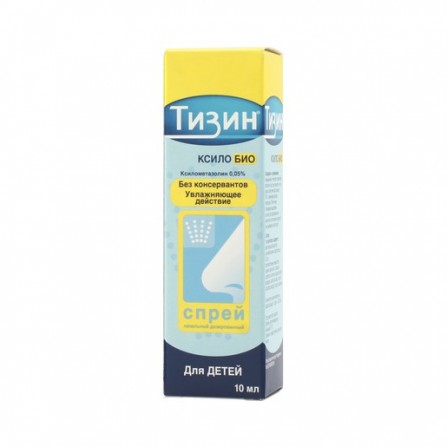Tizin Xylo BIO Spray nasal 0.05% 10 ml
Condition: New product
1000 Items
Rating:
Be the first to write a review!

More info
Active ingredients
Xylometazoline
Release form
Spray
Composition
Active ingredient: Xylometazoline Auxiliary substances: benzalkonium chloride - 0.2 mg, sorbitol 70% - 20.0 mg, sodium chloride - 4.16 mg, sodium dihydrogen phosphate dihydrate - 3.38 mg, disodium hydrogen phosphate dihydrate - 2.08 mg, disodium edetat - 1.0 mg, purified water - a sufficient amount. Concentration of the active substance (mg): 0.5 mg
Pharmacological effect
Vasoconstrictor drug for local use in ENT-practice. Xylometazoline (an imidazole derivative) is an alpha adrenergic mimetic. It has a vasoconstrictor effect, reduces swelling of the nasal mucosa. The drug facilitates nasal breathing by reducing swelling and hyperemia of the mucous membrane, and also improves the discharge of secretions. The effect of the drug occurs in 5-10 minutes.
Pharmacokinetics
With topical administration, xylometazoline is practically not absorbed, its plasma concentrations are so small that it is impossible to determine them by modern analytical methods.
Indications
To reduce swelling of the mucous membrane of the nasopharynx and secretions in acute allergic rhinitis, acute respiratory disease with symptoms of rhinitis, sinusitis, pollinosis, otitis media. Preparation of the patient for diagnostic manipulations in the nasal passages
Contraindications
Hypersensitivity to any of the components of the drug, the simultaneous use of monoamine oxidase inhibitors (MAO) or other drugs that can cause an increase in blood pressure; arterial hypertension, tachycardia, pronounced atherosclerosis, glaucoma, atrophic rhinitis, surgery on the meninges (in history), children's age (up to 6 years - for a dosage of 0.1%, up to 2 years - for a dosage of 0.05%).
Precautionary measures
The drug should be stored out of the reach of children at a temperature not higher than 25 ° C.
Use during pregnancy and lactation
Xylometazoline should not be used during pregnancy, because The effects of this drug on the fetus have not been studied. It is not known whether Xylometazoline is derived from breast milk. Therefore, it is not recommended to prescribe the drug during breastfeeding.
Dosage and administration
Children aged 2-6 years • Unless otherwise prescribed, one dose of the drug Tizin Xylo in the form of a 0.05% nasal spray dosed into each nasal passage 1-2 times a day. Adults and children of school age (older than 6 years) • 3 times a day, inject one dose of the drug Tizin Xylo as a 0.1% nasal spray dosed into each nostril.The dose depends on the individual sensitivity of the patient and the clinical effect. Xylometazoline in the form of a nasal dosage spray should not be used for more than 5-7 days, unless the doctor recommended a different duration of treatment. After completion of therapy, the drug can be reappointed only after a few days. Always consult with your doctor about the duration of use in children.
Side effects
Tizin Xylo can cause transient slight irritation of the nose (burning), paresthesia, sneezing and hypersecretion in susceptible people. In some cases, after the use of the drug, an increased swelling of the nasal mucosa can be observed (reactive hyperemia). Prolonged or frequent use of xylometazoline or its use in high doses can cause a burning sensation in the nose or dry mucous membranes, as well as reactive stagnation with the development of rhinitis. This effect can be observed even 5-7 days after the completion of treatment, and with prolonged use it can be the cause of irreversible damage to the mucous membrane with the formation of crusts (dry rhinitis). In very rare cases, headache, insomnia or fatigue, depression (with prolonged use in high doses) may occur. In rare cases, local intranasal use of sympathomimetics may be accompanied by systemic effects, such as palpitations, tachycardia, arrhythmias, increased blood pressure, and visual impairment.
Overdose
Symptoms: mydriasis, nausea, vomiting, cyanosis, fever, spasms, tachycardia, cardiac arrhythmia, collapse, cardiac arrest, hypertension, pulmonary edema, respiratory disorders, personality disorders, inhibition of CNS functions accompanied by drowsiness, decrease in body temperature, bradycardia, shock-like hypotonia , apnea, coma. Treatment: gastric lavage, the appointment of activated carbon, if necessary, artificial respiration with the introduction of oxygen. To reduce blood pressure - Phentolamine (dissolved in saline) IV slowly in a dose of 5 mg or orally in a dose of 100 mg. Vasopressor agents are contraindicated. If necessary, use antipyretic and anticonvulsant drugs.
Interaction with other drugs
With simultaneous use of the drug Tizin Ksilo and MAO inhibitors of the type of nilipromipin and tricyclic antidepressants may increase blood pressure.
special instructions
Prolonged use of the drug and overdose can lead to reactive hyperemia of the nasal mucosa. The recoil phenomenon can cause airway obstruction, which causes the patient to use the drug again or even constantly. This can lead to chronic edema (medical rhinitis), and sometimes even to atrophy of the nasal mucosa (ozen). In chronic rhinitis, use of the drug is possible only under medical supervision, given the risk of nasal atrophy. The drug should not be used in the presence of hypersensitivity to benzalkoniya chloride, which is part of the drug as a preservative. Effect on the ability to drive vehicles and control mechanisms During long-term treatment or when used in doses n recommended greater than the operation can not exclude the possibility of systemic effects on the cardiovascular system. In these cases, the ability to drive vehicles or equipment may be reduced.




